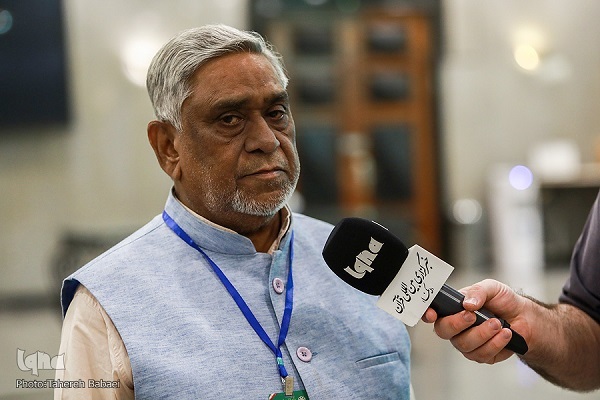AhlulBayt News Agency: An Indian scholar says one of the main challenges ahead of establishing unity in the Muslim world is the interests of the Western countries.
“The challenge ahead of unity is basically Western interests,” Akhtar Wasey, Professor Emeritus of Islamic studies at Jamia Millia Islamia University in New Delhi, told IQNA on the sidelines of the 36th International Islamic Unity Conference.
“Political interests of Western countries always create problems among Muslims,” he added.
Elsewhere talking about the importance of Muslim unity, the professor noted that there are always people and scholars who would oppose the idea of unity but Muslims have no other way but to unite.
He said that unity can be built up between Muslims based on commonalities as “Allah is One, the Prophet is one, and Quran is one.”
Wasey called on leaders of different religious faiths to come together and discuss ways to boost unity.
He went on to laud the staging of the International Islamic Unity Conference in Tehran, noting that the World Forum for Proximity of Islamic Thoughts is representing unity as its secretary-general is a Shia while its chairman is a Sunni.
Asked about the status of oppressed Palestinian people, he said, “The Palestinian cause is very dear to our heart because they are victims of annexation, exploitation, and marginalization.”
He lamented that those countries which are supposed to back Palestinians are actually establishing friendly ties with the occupying forces, pointing to normalization of ties between some Arab countries and the Israeli regime.
The professor also hailed Iran’s support for Palestinians, especially on Al-Quds Day which is held on the last Friday of Ramadan every year as millions of people across the world voice their support for the Palestinian cause.
He also proposed establishing a TV channel and social media to disseminate the message of unity to Muslims around the world.
The 36th International Conference on Islamic Unity was held here in the Iranian capital last week.
Some 200 foreign guests from 60 countries and 100 Iranian guests addressed the conference in person and virtually.
The International Islamic Unity Conference is annually held in Iran by the World Forum for Proximity of Islamic Schools of Thought (WFPIST) on the occasion of Islamic Unity Week.
The 17th day of Rabi al-Awwal, which fell on October 13 this year, is believed by Shia Muslims to mark the birth anniversary of Prophet Mohammad (PBUH), while Sunni Muslims regard the 12th day of the month (Sunday, October 9) as the birthday of the last prophet.
The interval between the two dates is celebrated every year as Islamic Unity Week.
The late founder of the Islamic Republic of Iran Imam Khomeini (RA) declared the occasion as Islamic Unity Week back in the 1980s.
/129
“The challenge ahead of unity is basically Western interests,” Akhtar Wasey, Professor Emeritus of Islamic studies at Jamia Millia Islamia University in New Delhi, told IQNA on the sidelines of the 36th International Islamic Unity Conference.
“Political interests of Western countries always create problems among Muslims,” he added.
Elsewhere talking about the importance of Muslim unity, the professor noted that there are always people and scholars who would oppose the idea of unity but Muslims have no other way but to unite.
He said that unity can be built up between Muslims based on commonalities as “Allah is One, the Prophet is one, and Quran is one.”
Wasey called on leaders of different religious faiths to come together and discuss ways to boost unity.
He went on to laud the staging of the International Islamic Unity Conference in Tehran, noting that the World Forum for Proximity of Islamic Thoughts is representing unity as its secretary-general is a Shia while its chairman is a Sunni.
Asked about the status of oppressed Palestinian people, he said, “The Palestinian cause is very dear to our heart because they are victims of annexation, exploitation, and marginalization.”
He lamented that those countries which are supposed to back Palestinians are actually establishing friendly ties with the occupying forces, pointing to normalization of ties between some Arab countries and the Israeli regime.
The professor also hailed Iran’s support for Palestinians, especially on Al-Quds Day which is held on the last Friday of Ramadan every year as millions of people across the world voice their support for the Palestinian cause.
He also proposed establishing a TV channel and social media to disseminate the message of unity to Muslims around the world.
The 36th International Conference on Islamic Unity was held here in the Iranian capital last week.
Some 200 foreign guests from 60 countries and 100 Iranian guests addressed the conference in person and virtually.
The International Islamic Unity Conference is annually held in Iran by the World Forum for Proximity of Islamic Schools of Thought (WFPIST) on the occasion of Islamic Unity Week.
The 17th day of Rabi al-Awwal, which fell on October 13 this year, is believed by Shia Muslims to mark the birth anniversary of Prophet Mohammad (PBUH), while Sunni Muslims regard the 12th day of the month (Sunday, October 9) as the birthday of the last prophet.
The interval between the two dates is celebrated every year as Islamic Unity Week.
The late founder of the Islamic Republic of Iran Imam Khomeini (RA) declared the occasion as Islamic Unity Week back in the 1980s.
/129

